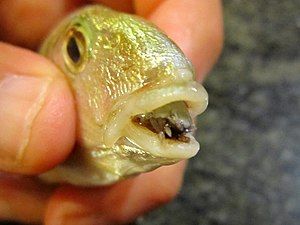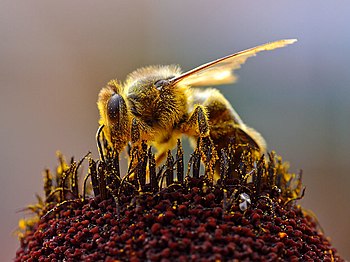Portal:Ecology
| |
|
|
Ecology
|
|
Ecology (from Ancient Greek οἶκος (oîkos) 'house', and -λογία (-logía) 'study of') is the natural science of the relationships among living organisms, including humans, and their physical environment. Ecology considers organisms at the individual, population, community, ecosystem, and biosphere levels. Ecology overlaps with the closely related sciences of biogeography, evolutionary biology, genetics, ethology, and natural history. Ecology is a branch of biology, and is the study of abundance, biomass, and distribution of organisms in the context of the environment. It encompasses life processes, interactions, and adaptations; movement of materials and energy through living communities; successional development of ecosystems; cooperation, competition, and predation within and between species; and patterns of biodiversity and its effect on ecosystem processes. Ecology has practical applications in conservation biology, wetland management, natural resource management (agroecology, agriculture, forestry, agroforestry, fisheries, mining, tourism), urban planning (urban ecology), community health, economics, basic and applied science, and human social interaction (human ecology). The word ecology (German: Ökologie) was coined in 1866 by the German scientist Ernst Haeckel. The science of ecology as we know it today began with a group of American botanists in the 1890s. Evolutionary concepts relating to adaptation and natural selection are cornerstones of modern ecological theory. Ecosystems are dynamically interacting systems of organisms, the communities they make up, and the non-living (abiotic) components of their environment. Ecosystem processes, such as primary production, nutrient cycling, and niche construction, regulate the flux of energy and matter through an environment. Ecosystems have biophysical feedback mechanisms that moderate processes acting on living (biotic) and abiotic components of the planet. Ecosystems sustain life-supporting functions and provide ecosystem services like biomass production (food, fuel, fiber, and medicine), the regulation of climate, global biogeochemical cycles, water filtration, soil formation, erosion control, flood protection, and many other natural features of scientific, historical, economic, or intrinsic value. (Full article...) Selected article -
Ecological art is an art genre and artistic practice that seeks to preserve, remediate and/or vitalize the life forms, resources and ecology of Earth. Ecological art practitioners do this by applying the principles of ecosystems to living species and their habitats throughout the lithosphere, atmosphere, biosphere, and hydrosphere, including wilderness, rural, suburban and urban locations. Ecological art is a distinct genre from Environmental art in that it involves functional ecological systems-restoration, as well as socially engaged, activist, community-based interventions. Ecological art also addresses politics, culture, economics, ethics and aesthetics as they impact the conditions of ecosystems. Ecological art practitioners include artists, scientists, philosophers and activists who often collaborate on restoration, remediation and public awareness projects. (Full article...)
Selected image -General imagesThe following are images from various ecology-related articles on Wikipedia.
Related WikiProjectsThings you can do
Entries here consist of Good and Featured articles, which meet a core set of high editorial standards.
 Parasitism is a close relationship between species, where one organism, the parasite, lives on or inside another organism, the host, causing it some harm, and is adapted structurally to this way of life. The entomologist E. O. Wilson characterised parasites as "predators that eat prey in units of less than one". Parasites include single-celled protozoans such as the agents of malaria, sleeping sickness, and amoebic dysentery; animals such as hookworms, lice, mosquitoes, and vampire bats; fungi such as honey fungus and the agents of ringworm; and plants such as mistletoe, dodder, and the broomrapes. There are six major parasitic strategies of exploitation of animal hosts, namely parasitic castration, directly transmitted parasitism (by contact), trophically-transmitted parasitism (by being eaten), vector-transmitted parasitism, parasitoidism, and micropredation. One major axis of classification concerns invasiveness: an endoparasite lives inside the host's body; an ectoparasite lives outside, on the host's surface. (Full article...)Selected biography -
Joan Roughgarden (born 13 March 1946) is an American ecologist and evolutionary biologist. She has engaged in theory and observation of coevolution and competition in Anolis lizards of the Caribbean, and recruitment limitation in the rocky intertidal zones of California and Oregon. She has more recently become known for her rejection of sexual selection, her theistic evolutionism, and her work on holobiont evolution. (Full article...)
Did you know (auto-generated)
Selected quote -
Ecology news
Additional News Highlights
Selected publication -Carbon Balance and Management is a peer-reviewed open-access scientific journal published by BioMed Central. The journal covers research on the global carbon cycle. The journal was established in 2006 and is abstracted and indexed in PubMed, Agricola, CAB International, Chemical Abstracts Service, EMBASE, and Scopus. (Full article...) Related portalsMore did you know -Related articlesAssociated WikimediaThe following Wikimedia Foundation sister projects provide more on this subject:
Web resources
Discover Wikipedia using portals |















































